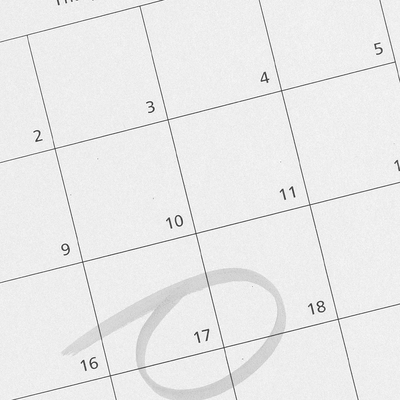

The Top 5 Causes of A Missed Period (That Aren’t Pregnancy)
First things first, having a good idea of what a regular period looks like for you is important, not least because it’ll help you identify when any irregularities occur. “A normal menstrual cycle typically spans between 21 to 35 days, with an average duration of around 28 days,” says Amit Shah, gynaecologist and co-founder of Fertility Plus. “During this cycle, menstruation usually lasts for three to five days.”
Extreme Exercise
Known as exercise-induced amenorrhea, missed periods can be common in women who train intensively. “Intense physical activity, such as rigorous training for endurance events or excessive gym workouts, can disrupt the body's hormonal balance,” explains Amit. “The stress placed on the body from extreme exercise can interfere with the production of reproductive hormones such as oestrogen and progesterone, impacting the normal menstrual cycle.”
As well as interfering with hormone production, there’s the calorie balance to consider. “Exercise itself doesn't cause menstruation to stop but exercise causes you to burn more calories than your body normally does,” says Dr Sonia Khorana, GP, dermatology expert and wellness and menopause lead at Kat & Co. “If you burn more calories than you eat, you create an energy deficit. If you have a calorie deficit and you don’t have much stored fat, the deficit can become too large. Without enough fuel month after month, your body starts to compensate by shifting energy away from certain bodily functions, like menstruation.”
To get your period back after strenuous exercise has paused it, it’s important to rethink your approach to training. Decreasing your workout load and even adapting it to include gentler forms of exercise is helpful, as is incorporating more rest days into your schedule. Not only will rest days help reinstate your menstrual cycle, but they’re also essential for proper muscle repair and growth.
Chronic Stress
Any kind of stress, whether physical like strenuous exercise or emotional, can interrupt hormone production. Although cortisol secretion is governed by the HPA axis (hypothalamic-pituitary-adrenal axis) and the reproductive system is governed by the HPG axis (hypothalamic-pituitary-gonadal axis) both systems are driven by the hypothalamus and pituitary gland in the brain. This means when the HPA is altered due to stress-induced cortisol secretion, it also alters the HPG. This activity can then affect the hormones that are essential to ovary stimulation. Although missing a period due to stress is common, you might also notice changes to your period, which can include spotting, a period that arrives early, or a period that differs from usual in terms of consistency, length and colour. If you suspect stress is the cause, it’s important to make some lifestyle changes to try and get your cycle back on track. A good nutrition plan, gentle exercise, good sleep habits and reversing the cause of the stress are all good ways to start.
Perimenopause
Menstrual irregularities are common and can impact anyone who has periods. According to Sonia, periods tend to be irregular when they first start during puberty, then again when you're nearing menopause. “Irregularities in menstrual cycles accompanied by symptoms such as hot flashes, night sweats and mood swings can be indicative of the onset of menopause,” agrees Amit. “While this transition is more commonly observed in women over the age of 45, it can occur in some individuals at a younger age. These symptoms typically signal changes in hormone levels as the body gradually transitions out of the reproductive phase.” NHS guidelines suggest consulting your GP or healthcare practitioner if you miss three periods in a row, whatever you suspect the underlying cause to be. If you think perimenopause could be a possibility, it’s important to speak to your doctor to see what options are available to you.
Polycystic Ovary Syndrome (PCOS)
PCOS is a common hormone problem for women of childbearing age, with one of the key factors being higher than normal amounts of androgens. Androgens are a group of sex hormones that play a role in reproductive health. Women who have higher amounts of androgens due to PCOS can experience interferences with egg development and ovulation, leading to missed periods. Aside from menstrual irregularities, common symptoms of PCOS include weight gain, fertility problems, excess hair growth, acne or very oily skin, and thinning hair on the head or hair loss. If you think you may have PCOS, it’s important to speak to your doctor in case diagnostic tests are needed to confirm the condition.
Weight Changes
Hormone levels are affected by your weight and the amount of fat on your body, which means your menstrual cycle is one of the first things to be affected if you gain or lose a lot of weight. Being underweight and not getting enough calories, or having too little body fat, stops the production of hormones needed for ovulation. Similarly, too much body fat (known as adipose tissue) produces extra oestrogen which causes an imbalance of the hormone which can then stop your period. “Obesity can also impact hormone levels in the body, especially insulin and leptin, which are involved in regulating the menstrual cycle,” explains Amit. “Excess body fat can lead to insulin resistance, which can then disrupt ovarian function and interfere with the menstrual cycle.” Rapid weight fluctuations can also interfere with your menstrual cycle, causing spotting, cramping or heavier and longer periods.
Visit FertilityPlus.org.uk & CcKat.com
DISCLAIMER: Features published by SheerLuxe are not intended to treat, diagnose, cure or prevent any disease. Always seek the advice of your GP or another qualified healthcare provider for any questions you have regarding a medical condition, and before undertaking any diet, exercise or other health-related programme.
DISCLAIMER: We endeavour to always credit the correct original source of every image we use. If you think a credit may be incorrect, please contact us at info@sheerluxe.com.